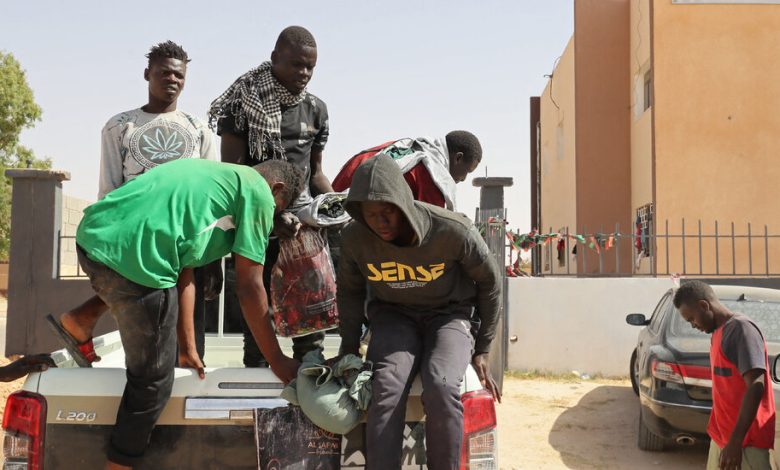In a Bid to Curb Migrants, Europe Strikes a Deal With Tunisia

BRUSSELS — The European Union has struck a deal with Tunisia to try to stem the number of migrants crossing the Mediterranean, amid heated debate over the fallout of the bloc’s migration policies, including a shipwreck last month that was the deadliest in decades.
Under the agreement, reached late Sunday, the Tunisian government committed itself to tightening its sea borders and combating people-smuggling networks, as well as expediting the return of Tunisians who reside illegally in Europe. The E.U. will provide a broad package of support for the North African country’s embattled economy.
Tunis, the capital, is a major port city less than 130 nautical miles from the Italian island of Sicily, and even closer to smaller Italian islands. That makes Tunisia not just a source of migrants itself but also a major transit stop for sub-Saharan Africans who are trying to reach Europe.
Tunisian authorities have come under fire for alleged rights abuses of sub-Saharan migrants, including rounding up hundreds of them and abandoning them at the desert border with Libya with no food or water.
On Sunday, the European bloc promised Tunisia 105 million euros, or $118 million, for equipment like patrol boats and drones, as well as for training and technical support for border guards. It will also help cover the cost of voluntary repatriation for sub-Saharan migrants.
In June, more than 600 migrants died when their overloaded vessel capsized off the coast of Greece. The scope of the loss, as well as the failure of European officials to come to the aid of the flailing ship in the long hours before it tipped over, escalated the debate over the bloc’s role in the crisis.
“The tragic shipwreck a few weeks ago, in which many people lost their lives, was yet another call for action,” Ursula von der Leyen, the head of the European Commission, the E.U. executive arm, told reporters in Tunis on Sunday. “We need to crack down on criminal networks of smugglers and traffickers.”
Apart from the 105 million euros to combat irregular migration, the E.U. officials also pledged 150 million euros — $169 million — in budget support for Tunisia, but did not elaborate on how the money would be spent. The bloc said there was also “an offer on the table” of 900 million euros, or over $1 billion, of macro financial assistance, contingent upon Tunisia agreeing to reforms set out by the International Monetary Fund.
Europe significantly toughened its migration policies following the arrival of over one million refugees, mainly from Syria, from 2015 to 2016, fueling support for far-right parties who denounced the influx as a threat to European people and cultures. The bloc, along with public opinion, shifted toward harsher policies that some mainstream parties had previously considered contrary to European values.
Now, with millions of Ukrainian refugees having arrived in Europe over the course of last 18 months, asylum systems are overburdened, and European politicians are seeking new ways to reduce the number of newcomers.
The deal was announced on Sunday by Ms. von der Leyen, Prime Minister Mark Rutte of the Netherlands, Prime Minister Giorgia Meloni of Italy and President Kais Saied of Tunisia. To take effect it must be formally endorsed by the heads of all E.U. governments, which is expected.
“Tunisian people provided for all these displaced migrants anything they could expect with full hospitality, with unlimited generosity, whereas so many other organizations that should have played their role in a proper way did not move, only through statements,” Mr. Saied told reporters. “The solution to this inhumane situation can only be a common and a joint one”
Mr. Rutte, leader of a centrist coalition, and Ms. Meloni, a right-wing populist, are unlikely bedfellows, but their countries have been deeply affected by the rising migration levels: Italy as one of Europe’s main gateways, and the Netherlands as the destination of choice for many migrants. Last week, Mr. Rutte’s government collapsed over a proposed refugee policy.
On Sunday, both leaders praised the deal, with Ms. Meloni describing it as a “model” for future relations with North African countries.
E.U. officials said they hoped that bolstered funding and closer cooperation would give them more leverage in trying to curb abuses by the Tunisian authorities.
But human rights experts, analysts and lawmakers criticized the agreement, pointing out the dangers of financially rewarding foreign governments for stemming the flow of migrants.
For years, the European Union has been bankrolling the Libyan Coast Guard, which has a well-documented record of abusing migrants, to limit the number of people arriving on its shores. Now, critics said, the bloc is repeating the same scenario with Tunisia.
Mr. Saied has spearheaded a hate campaign against workers and students from sub-Saharan Africa, accusing them of trying to replace the native Tunisian population. Mr. Saied — who has also been criticized for rolling back democracy and the rights of its own citizens — has denied accusations of racism, asserting that legal migrants had nothing to fear.
“The deal shows that once again, Europe is ready to turn a blind eye to its values to provide a short-term fix to a migration problem,” said Camille Le Coz, associate director of the Brussels-based Migration Policy Institute. “What’s missing is a reference to protection concerns and the human rights abuses against migrants.”



